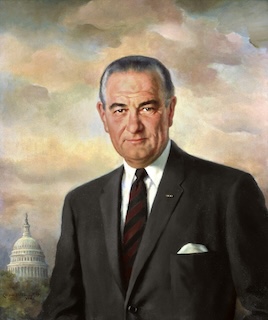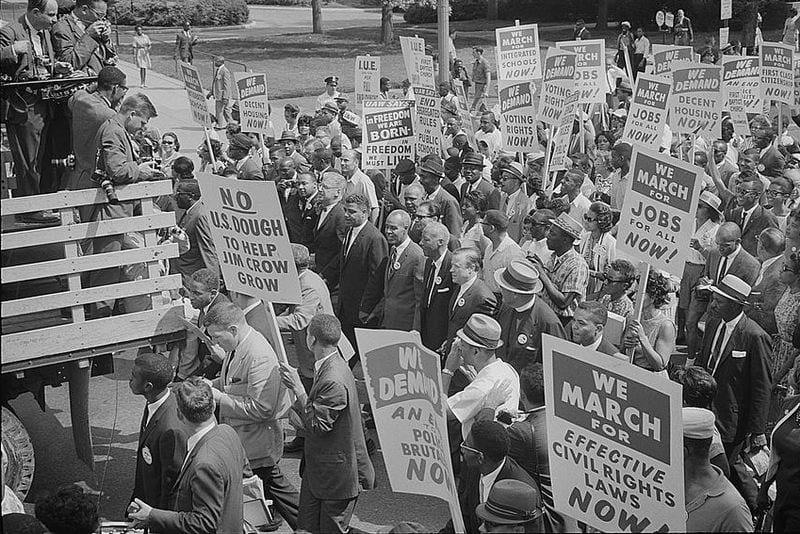Introduction
In early 1965, as the government of South Vietnam appeared to be losing to insurgent forces supported by North Vietnam, President Johnson made the decision to send U.S. combat forces to Vietnam and to bomb North Vietnamese targets using U.S. aircraft and crews. In April 1965, Johnson gave this televised address at Johns Hopkins University in Baltimore, Maryland, to explain why the United States was fighting in Vietnam. Like his predecessors, Johnson presented the conflict in Vietnam as a major test of American determination to stop the spread of aggression. He compared the war to the actions taken by the United States to protect Europe during and after World War II.
—David Krugler
Source: Address at Johns Hopkins University: “Peace Without Conquest,” April 7, 1965, Public Papers of the Presidents of the United States: Lyndon B. Johnson, 1965, Book I (Washington, D.C. : U. S. Government Printing Office, 1966), 394–399. Available online from Gerhard Peters and John T. Woolley, The American Presidency Project. https://goo.gl/p9vRYJ.
. . . Tonight Americans and Asians are dying for a world where each people may choose its own path to change.
This is the principle for which our ancestors fought in the valleys of Pennsylvania. It is the principle for which our sons fight tonight in the jungles of Viet-Nam.
Viet-Nam is far away from this quiet campus. We have no territory there, nor do we seek any. The war is dirty and brutal and difficult. And some 400 young men, born into an America that is bursting with opportunity and promise, have ended their lives on Viet-Nam’s steaming soil.
Why must we take this painful road?
Why must this Nation hazard its ease, and its interest, and its power for the sake of a people so far away?
We fight because we must fight if we are to live in a world where every country can shape its own destiny. And only in such a world will our own freedom be finally secure.
This kind of world will never be built by bombs or bullets. Yet the infirmities of man are such that force must often precede reason, and the waste of war, the works of peace.
We wish that this were not so. But we must deal with the world as it is, if it is ever to be as we wish.
The Nature of the Conflict
The world as it is in Asia is not a serene or peaceful place.
The first reality is that North Viet-Nam has attacked the independent nation of South Viet-Nam. Its object is total conquest.
Of course, some of the people of South Viet-Nam are participating in attack on their own government. But trained men and supplies, orders and arms, flow in a constant stream from north to south.
This support is the heartbeat of the war.
And it is a war of unparalleled brutality. Simple farmers are the targets of assassination and kidnapping. Women and children are strangled in the night because their men are loyal to their government. . . .
Over this war – and all Asia – is another reality: the deepening shadow of Communist China. The rulers in Hanoi are urged on by Peking. This is a regime which has destroyed freedom in Tibet, which has attacked India, and has been condemned by the United Nations for aggression in Korea. It is a nation which is helping the forces of violence in almost every continent. The contest in Viet-Nam is part of a wider pattern of aggressive purposes.
Why Are We in Viet-Nam?
Why are these realities our concern? Why are we in South Viet-Nam?
We are there because we have a promise to keep. Since 1954 every American President has offered support to the people of South Viet-Nam. We have helped to build, and we have helped to defend. Thus, over many years, we have made a national pledge to help South Viet-Nam defend its independence.
And I intend to keep that promise.
To dishonor that pledge, to abandon this small and brave nation to its enemies, and to the terror that must follow, would be an unforgivable wrong.
We are also there to strengthen world order. Around the globe, from Berlin to Thailand, are people whose well-being rests, in part, on the belief that they can count on us if they are attacked. To leave Viet-Nam to its fate would shake the confidence of all these people in the value of an American commitment and in the value of America’s word. The result would be increased unrest and instability, and even wider war.
We are also there because there are great stakes in the balance. Let no one think for a moment that retreat from Viet-Nam would bring an end to conflict. The battle would be renewed in one country and then another. The central lesson of our time is that the appetite of aggression is never satisfied. To withdraw from one battlefield means only to prepare for the next. We must say in southeast Asia – as we did in Europe – in the words of the Bible: “Hitherto shalt thou come, but no further.” . . .
Our Objective in Viet-Nam
Our objective is the independence of South Viet-Nam, and its freedom from attack. We want nothing for ourselves – only that the people of South Viet-Nam be allowed to guide their own country in their own way.
We will do everything necessary to reach that objective. And we will do only what is absolutely necessary. . . .
We hope that peace will come swiftly. But that is in the hands of others besides ourselves. And we must be prepared for a long continued conflict. It will require patience as well as bravery, the will to endure as well as the will to resist. . . .
The Dream of World Order
This will be a disorderly planet for a long time. In Asia, as elsewhere, the forces of the modern world are shaking old ways and uprooting ancient civilizations. There will be turbulence and struggle and even violence. Great social change – as we see in our own country now – does not always come without conflict. . . .
Conclusion
. . . Every night before I turn out the lights to sleep I ask myself this question: Have I done everything that I can do to unite this country? Have I done everything I can to help unite the world, to try to bring peace and hope to all the peoples of the world? Have I done enough?
Ask yourselves that question in your homes – and in this hall tonight. Have we, each of us, all done all we could? Have we done enough? . . .
This generation of the world must choose: destroy or build, kill or aid, hate or understand.
We can do all these things on a scale never dreamed of before.
Well, we will choose life.4 In so doing we will prevail over the enemies within man, and over the natural enemies of all mankind. . . .


































































































































































































































































